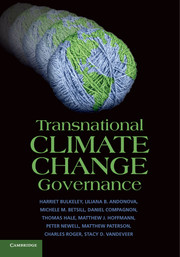Book contents
- Frontmatter
- Contents
- List of Figures and Tables
- Acknowledgements
- Acronyms and Abbreviations
- 1 Introducing Transnational Climate Change Governance
- 2 Mapping the World of Transnational Climate Change Governance
- 3 Theoretical Perspectives on Transnational Governance
- 4 Origins, Agency and the Forms of Transnational Climate Change Governance
- 5 Constructing Transnational Climate Change Governance Issues and Producing Governance Spaces
- 6 The Uneven Geography of Transnational Climate Change Governance
- 7 Understanding Authority and Legitimacy in Transnational Climate Change Governance
- 8 Making a Difference? Tracing the Effects and Effectiveness of Transnational Climate Change Governance
- 9 Conclusions – Looking Beyond Transnational Climate Change Governance
- References
- Index
9 - Conclusions – Looking Beyond Transnational Climate Change Governance
Published online by Cambridge University Press: 05 August 2014
- Frontmatter
- Contents
- List of Figures and Tables
- Acknowledgements
- Acronyms and Abbreviations
- 1 Introducing Transnational Climate Change Governance
- 2 Mapping the World of Transnational Climate Change Governance
- 3 Theoretical Perspectives on Transnational Governance
- 4 Origins, Agency and the Forms of Transnational Climate Change Governance
- 5 Constructing Transnational Climate Change Governance Issues and Producing Governance Spaces
- 6 The Uneven Geography of Transnational Climate Change Governance
- 7 Understanding Authority and Legitimacy in Transnational Climate Change Governance
- 8 Making a Difference? Tracing the Effects and Effectiveness of Transnational Climate Change Governance
- 9 Conclusions – Looking Beyond Transnational Climate Change Governance
- References
- Index
Summary
Our intention at the outset of this project was to move beyond the focus on individual cases or particular segments of the world of TCCG in order to examine what we might be able to discover collectively about this phenomenon. In this final chapter, we return to this overarching theme and identify the ways in which our analysis of TCCG contributes to ongoing debates in the field.
Underpinning this contribution, we suggest, are two novel aspects of our work. First, the book provides the first analysis of transnational governance that includes both an extensive database of a large number and a diverse array of particular case-studies. Existing research in the field of transnational governance has been mostly based on either individual examples or a small number of cases; whereas these can provide rich and nuanced analyses, there is nevertheless a significant value added in attempting to say something about this phenomenon as a whole. While we have not been able to survey the entire universe of cases in the transnational climate governance arena, a task that would be difficult to undertake given that much of this activity is relatively unknown, we have devised a strategy to maximise the diversity of cases we explore. In the sense that the approach we have developed includes the full variety of forms of TCCG, we thus suggest that it can be regarded as representative of the phenomenon as a whole. The database approach has enabled us to see patterns in the types of initiatives that predominate in TCCG, in terms of the types of actors, the issues upon which they focus, the forms of institutionalisation, the practices of governance, the claims to legitimacy and the geographical reach of TCCG initiatives.
- Type
- Chapter
- Information
- Transnational Climate Change Governance , pp. 178 - 186Publisher: Cambridge University PressPrint publication year: 2014



